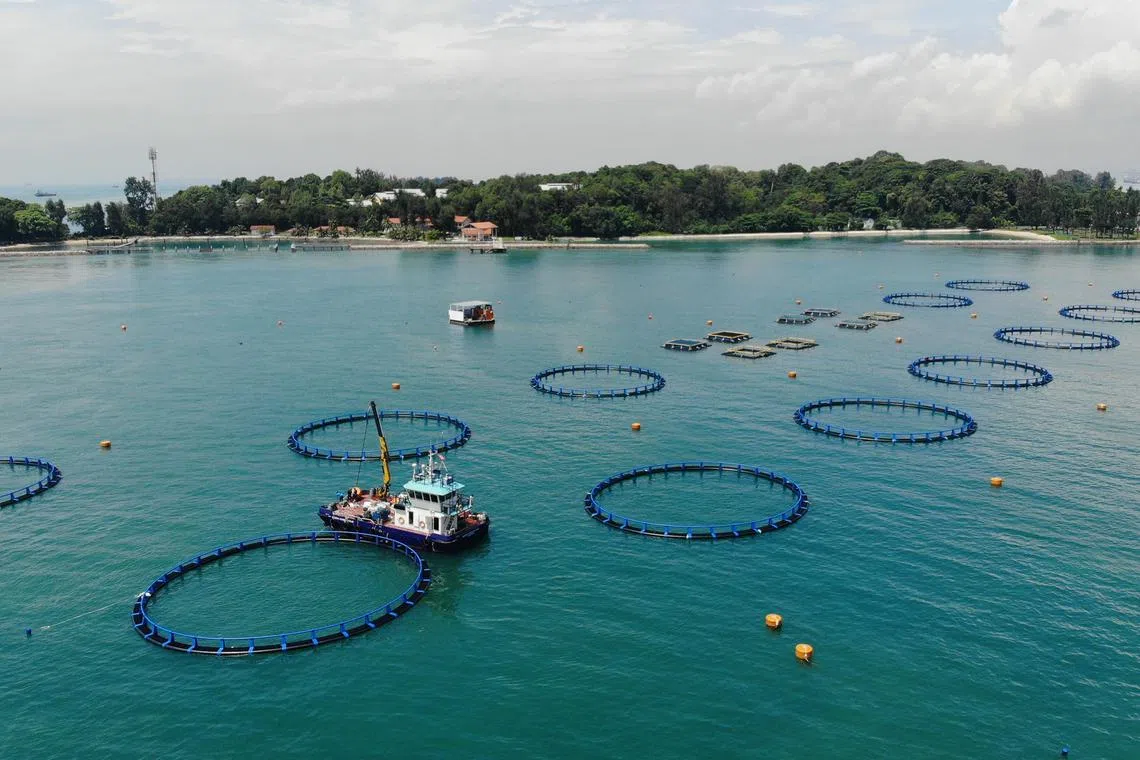Scientists in Singapore develop new vaccine for fatal disease in Asian sea bass
Sign up now: Get ST's newsletters delivered to your inbox

An SDDV outbreak in June 2023 had forced the Barramundi Group to temporarily stop farming in the southern waters.
PHOTO: BARRAMUNDI GROUP
Follow topic:
SINGAPORE – There is renewed hope for businesses farming Asian sea bass in Singapore, now that a new vaccine has been developed to protect the fish from a deadly virus, which is endemic in local waters.
Called the scale drop disease virus (SDDV), it can kill up to 70 per cent of a pen of Asian sea bass, or barramundi, at a time.
With the new vaccine, the survivability rate of the fish is increased by around 75 per cent, should they be infected with the virus.
While it cannot be transmitted to humans, the virus causes the fish to shed scales and develop skin lesions.
Fish farms in the Johor Strait, where the majority of the businesses are located, have occasionally reported signs of the virus, which affects barramundi and yellowfin seabream.
An SDDV outbreak in June 2023 had forced fish farm operator Barramundi Group to temporarily stop farming in the southern waters.
The company told The Straits Times in July 2023 that the virus had caused “significant mortalities and financial losses” for its operations in Singapore. It recorded a loss of $31.9 million for financial year 2022.
In May 2024, its head of its head of strategy and operations Tan Ying Quan told ST that the company had decided to exit farming in Singapore
But Barramundi Group has continued its research and development work in Singapore. This includes developing fish vaccines through its subsidiary Uvaxx, and a selective breeding programme to rear Asian sea bass that grows faster and is resistant to SDDV.
The new epitope-based vaccine, which has fewer side effects compared with traditional vaccines, was developed by researchers from Uvaxx and the Agency for Science, Technology and Research (A*Star).
The new vaccine contains epitopes or proteins from specific portions of the SDDV that can be recognised by the fish’s immune system once it is injected, said Uvaxx and A*Star in a joint statement on July 19.
These proteins can help the system elicit a targeted immune response to fight the virus.
Conventional vaccines use whole live viruses or inactivated viruses, which tend to bring about more side effects.
In addition, conventional vaccines require the growing and processing of whole pathogens, whereas epitope-based vaccines are created by working with only specific peptides, which is often more cost-effective and can leverage traditional chemical technologies for scalable mass production.
The vaccine can be integrated into routine operations at hatcheries, and administered to juvenile fish before they are transferred to the sea farms, where they become more susceptible to an SDDV infection.
The team is now looking to further refine the vaccine formulations and prepare the product for market launch in Singapore and other regional markets that have SDDV outbreaks, such as Indonesia, Thailand and Malaysia.
At the same time, the team is conducting commercial-scale field trials with local farm partners, while evaluating the vaccine’s safety and efficacy.
They will also be obtaining regulatory approval and setting up the vaccine manufacturing process, according to A*Star and Uvaxx.
When asked about the vaccine’s cost, they said that this will be determined at a later stage when manufacturing, distribution and market issues have been finalised.
While the vaccine is designed to target SDDV in barramundi fish, the technology and methodologies can be adapted to counter emerging viruses in other fish species.
Barramundi Group’s chief executive James Kwan noted that the epitope-based technology can help Uvaxx venture into developing vaccines against other viral fish diseases more cost-effectively than conventional vaccine providers.
The vaccine development was one of 12 projects that were awarded a total of $23 million in grant funding from the Singapore Food Agency (SFA) to develop the agri-food system and support Singapore’s goal of producing 30 per cent of its nutritional needs locally by 2030.
Dr Ngin Hoon Tong, senior director of SFA’s science and technology division, said: “The novel SDDV vaccine is a promising development in our drive towards a more secure and sustainable food supply, and leverages Singapore’s biotech expertise.”


